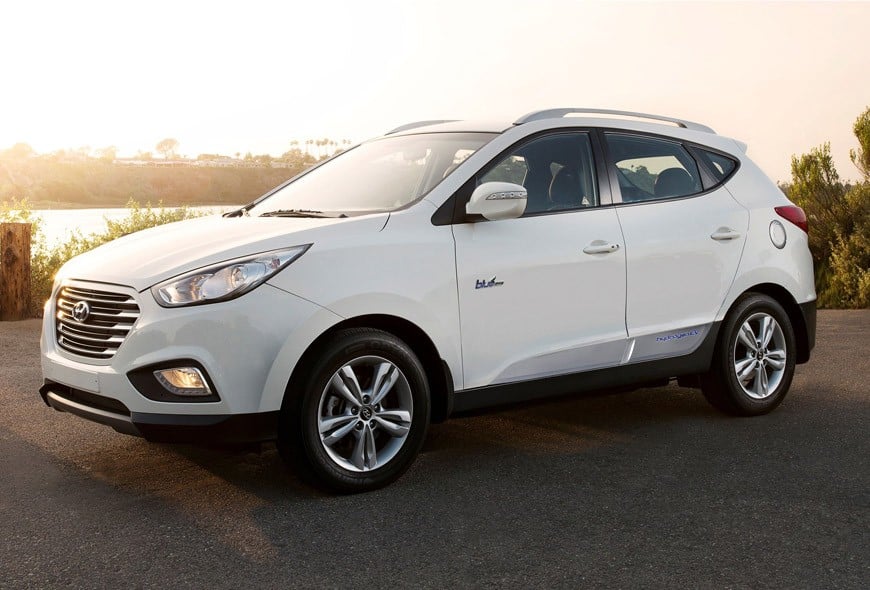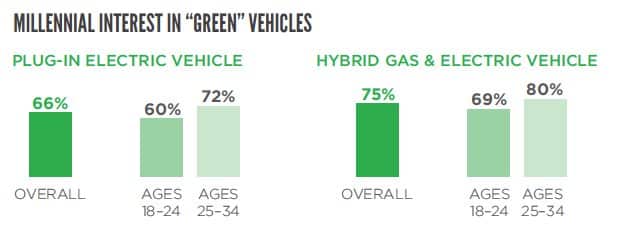Before purchasing a new car, there are many factors to consider. Price, technology, style, and color are all important variables in determining which vehicle best compliments a particular lifestyle. But millennial car buyers are not only looking for sweet car deals, they’re also focusing on eco-friendly vehicles that can get great gas mileage.
Fuel-efficient gas, electric, and hybrid cars are among some of the more alluring options that young people consider when shopping for a car. In fact, 32 states across the country have incentivized programs to promote the purchase of electric cars. But savvy consumers look at their options closely before making that “all-important decision” since it’s likely that they will own the vehicle for years.
Anywhere There is Electricity
The best thing about buying an electric car is that gasoline is no longer needed. And while electric cars are limited in the distance they can travel prior to a recharge, auto-manufacturers like Chevy, Tesla and Nissan all have plans to develop longer range vehicles in the near future. The goal is to achieve a whopping 200 miles per charge, instead of the current 84 miles you get from the Nissan Leaf, the most popular selling electric car on the market.
Best of Both Worlds for Millennial Car Buyers
If an electric car isn’t practical, there is the option of a hybrid- a car that is equipped to harness power from both gas and electric sources. The concept of owning a hybrid is one that many young eco-friendly Americans are embracing.
According to a national poll of U.S. homeowners commissioned by Clean Edge, Inc. and SolarCity and conducted by national polling firm Zogby Analytics, hybrid cars was one of the most planned clean-energy future purchase options for homeowners. Other renewable energy sources included LED light bulbs, smart thermostats, Energy Star-rated hot water heaters, and double-or triple-pane windows.
For millennial car buyers thinking green, and still wanting the ability to use a gasoline engine when called for, the hybrid is a great middle-of-the road compromise.
Once regulated to just small hatchbacks, hybrid vehicles have grown to include family sedans, SUVs and even full-size luxury sedans. All of these vehicles combine a conventional internal-combustion engine with at least one electric motor and a battery pack, and a few offer plug-in capability.
“When gas prices are a little higher, we notice an uptick in hybrid sales,” said Jeff McClure, a Toyota specialist who represents the company at auto shows. “Fuel efficiency is always a factor.”
Because of their variety of options, forecasters are expecting U.S. sales of hybrid vehicles to hit the 5 million milestone by the end of 2016- an astonishing achievement when you consider that hybrid vehicles went on sale in 2000 when Toyota introduced them to a skeptical car market. And if those predictions ring true, it will mean that hybrid sales would have doubled in the last four years alone, solidifying the future of the hybrid concept for years to come as a vehicle of consequence.
The Cheap Gas Impact
The success of hybrid sales in the short term is contingent upon the cost of gasoline. Since oil prices dropped last summer, cheaper gas prices have been experienced by all. This factor could impact which vehicles consumers decide to buy if the price of fuel is not a hindrance in the car shopping experience.
According to AAA, for the week of May 10 the national average for a gallon of regular gas was $2.66, roughly $1.00 cheaper than one year ago. This year, motorist will see the lowest summer gasoline prices since 2009, according to the Energy Department, and AAA predicts most U.S. travelers will pay the cheapest Memorial Day gas prices in at least five years.
“It’s a very realistic average, but like a lot of averages, it doesn’t speak to some of the lumpiness you’ll see,” said Tom Kloza, chief oil analyst at Oil Price Information Service. When gas prices fall and with automakers designing powerful, more fuel-efficient engines, consumers have taken notice.
The average fuel economy of cars and trucks increased from 20.9 mpg in 2007 to 25.5 mpg in 2014. The collaboration of all the variables involved resulted in 17 million vehicles sold for 2014, the highest number since 2006.
Rise in Auto Manufacturing
In March, it was announced that automakers had seen a rise in February sales amid another strong month for trucks and sport-utility vehicles that is expected to grow in the summer months. As the auto-industry continues to rebound nicely from the recession of 2007-08, it will be interesting to see what role millennial car buyers will play in shaping the vehicles of the future.



